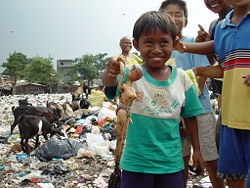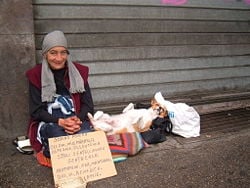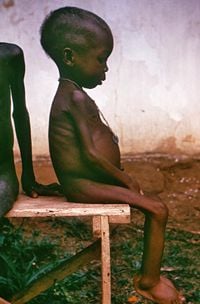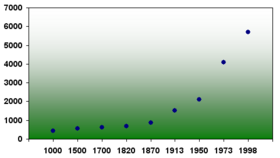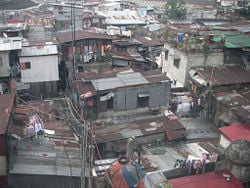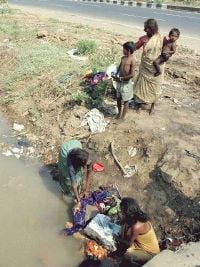Poverty is a condition in which a person or community is deprived of, or lacks, the essentials for a minimum standard of well-being and life. Since poverty is understood in many senses, these essentials may be material resources such as food, safe drinking water, and shelter, or they may be social resources such as access to information, education, health care, social status, political power, or the opportunity to develop meaningful connections with other people in society.
Poverty may also be defined in relative terms. In this view income disparities or wealth disparities are seen as an indicator of poverty and the condition of poverty is linked to questions of scarcity and distribution of resources and power. Poverty is also a type of religious vow, a state that may be taken on voluntarily in keeping with practices of piety and the effort to come closer to God and the realm of spirit by denying the desires of the body.
However it is defined, poverty naturally causes suffering because it involves the lack of something essential to human life. In the ideal, all people should be able to satisfy their needs and experience lives of health, happiness, and prosperity, not poverty.
Causes of poverty
Many different factors have been cited to explain why poverty occurs. However, no single explanation has gained universal acceptance. Some possible factors include:
Material
One possible cause of poverty is lack of material, which takes a number of forms. Natural factors such as climate or environment, combined with geographic factors can have a great affect. Geographic factors include access to fertile land, fresh water, minerals, energy, and other natural resources. Presence or absence of natural features helping or limiting communication, such mountains, deserts, navigable rivers, or coastline. Historically, geography has prevented or slowed the spread of new technology to areas such as the Americas and sub-Saharan Africa. The climate also limits what crops and farm animals may be used on similarly fertile lands.[1] On the other hand, research has found that countries with an abundance of natural resources creating quick wealth from exports tend to have less long-term prosperity than countries with less of these natural resources.
Inadequate nutrition in childhood in poor nations may lead to physical and mental stunting that, in turn, may lead to economic problems. Hence, this may be both a cause and an effect. For example, lack of both iodine and iron has been implicated in impaired brain development, and this can affect enormous numbers of people. Disease, specifically diseases of poverty can make poverty even worse. AIDS, malaria, and tuberculosis among others overwhelmingly afflict developing nations, which perpetuate poverty by diverting individual, community, and national health and economic resources from investment and productivity. Further, many tropical nations are affected by parasites like malaria, schistosomiasis, and trypanosomiasis that are not present in temperate climates. The Tsetse fly makes it very difficult to use many animals in agriculture in afflicted regions.
Economic
Economics offers a number of explanations for poverty. The first is poverty itself, which prevents (for example) various forms of investment. Also important is the inability to find a well-paying job, unemployment and/or underemployment. Many argue that globalization is having an adverse economic effect on poverty. These critics claim that globalization leads to economic exploitation of the developing world by rich countries. This alleged exploitation takes the form of sweatshops, overuse of land, and the use of monopoly power to exploit those without recourse to competitive services or products.
Many claim that restrictions on free trade contribute to poverty, in particular, the very high subsidies to and protective tariffs for agriculture in the developed world. This drains the taxed money and increases the prices for the consumers in developed world; decreases competition and efficiency; prevents exports by more competitive agricultural and other sectors in the developed world due to retaliatory trade barriers; and undermines the very type of industry in which the developing countries do have comparative advantages.[2]
Political
Political factors influencing poverty can include lacking the rule of law, democracy, infrastructure, which is normally the responsibility of a sound government; lacking health care, which distracts citizens from participation in government; or lacking education, which likewise prevents entry into the realm of politics.[3][4] Government corruption can also lead to poverty as citizens do not receive the benefits of their own taxes or of international aid organizations.
A country's status as a tax haven can contribute to poverty as well. These havens, which tax their own citizens and companies but not those from other nations and refuse to disclose information necessary for foreign taxation, can cripple their own peoples. The practice of not taxing foreign companies enables large scale political corruption, tax evasion, and organized crime in the foreign nations.[5]
Historical factors, for example imperialism and colonialism, Capitalism, Socialism, Communism, Monarchy, Fascism, and Totalitarianism have all been named as causes by scholars writing from different perspectives.[6][7] For example, poorly functioning property rights is seen by some as a cause of poverty, while socialists see the institution of property rights itself as a cause of poverty.[8]
Social
There exist many social factors leading to poverty on top of those previously listed. Lack of freedom and social oppression can lead to people being unable to take political or economic action to their benefit. Lack of social integration stunts the development of any productive social action groups, making it difficult to become involved in politics on a grand scale. The existence of slavery around the world prevents the accumulation of any wealth and has severe psychological repercussions for those forced into it. Crime, both white-collar crime and blue-collar crime can stunt economic growth as much as government corruption can, also leading to increased levels of poverty. War, including civil war, genocide, and democide can completely disrupt an economy, throwing all the participants at the margins into poverty. Another controversial phenomenon is the "brain drain" of intelligent people from developing countries moving to rich countries to pursue careers.
On a more personal level, high levels of substance abuse, such as alcoholism and drug abuse prevent personal accumulation of wealth and can be general blights on society. Individual beliefs, actions, and choices may also be factors, as in the Christian ascetic tradition.[9] Mental illness and disability, such as autism and schizophrenia, damage one's position in society and can prevent employment or accumulation of wealth. Finally, discrimination of various kinds, such as age discrimination, gender discrimination, racial discrimination can keep deserving, able people out of jobs and lock them into cycles of poverty.
Effects of poverty
Some effects of poverty may also be causes, as listed above, thus creating a "poverty cycle" and complicating the subject further. Some of these effects include Depression, lack of sanitation, increased vulnerability to natural disasters, extremism of political views or actions, hunger, starvation, malnutrition, human trafficking, and increased suicides.
Some of the larger society-wide effects include increased risk of political violence; such as terrorism, war, and genocide, homelessness, lack of opportunities for employment, high crime rate, low literacy, social isolation, loss of population due to emigration, increased discrimination, lower life expectancy and drug abuse.
Measuring poverty
Although the most severe poverty is in the developing world, there is evidence of poverty in every region. Poverty may be seen as the collective condition of poor people, or of poor groups, and in this sense entire nation-states are sometimes regarded as poor. To avoid stigma these nations are usually called developing nations.
When measured, poverty may be absolute or relative. Relative poverty views poverty as socially defined and dependent on social context. In this case, the number of people counted as poor could increase while their income rise. A relative measurement would be to compare the total wealth of the poorest one-third of the population with the total wealth of richest 1 percent of the population.
Absolute poverty refers to a set standard which is consistent over time and between countries. An example of an absolute measurement would be the percentage of the population eating less food than is required to sustain the human body (approximately 2000-2500 calories per day).
The international poverty line is a monetary threshold under which an individual is considered to be living in poverty. It is calculated by taking the value of the goods needed to sustain one adult and converting it into dollars. The current international poverty line is $1.90 per day.[10] The World Bank reported that the global extreme poverty rate fell to 9.2 percent in 2017, from 10.1 percent in 2015, equivalent to 689 million people living on less than $1.90 a day. Four out of five people below the international poverty line lived in rural areas. A preliminary estimate for 2020, incorporating the effects of the COVID-19 pandemic, projected additional poor to be more urban dwelling and work in the sectors most affected by lockdowns and mobility restrictions rather than in agriculture. At higher poverty lines, 24.1 percent of the world lived on less than $3.20 a day and 43.6 percent on less than $5.50 a day in 2017.[11]
The World Bank's "Voices of the Poor," based on research with over 20,000 poor people in 23 countries, identified a range of factors which poor people consider elements of poverty.[12] Most important are those necessary for material well-being, especially food. Many others relate to social rather than material issues.
- precarious livelihoods
- excluded locations
- gender relationships
- problems in social relationships
- lack of security
- abuse by those in power
- dis-empowering institutions
- limited capabilities, and
- weak community organizations.
Poverty reduction
In politics, the fight against poverty is usually regarded as a social goal and many governments have — secondarily at least — some dedicated institutions or departments.
Economic growth
The anti-poverty strategy of the World Bank depends heavily on reducing poverty through the promotion of economic growth and shared prosperity.[13] However, some consider this approach does not actively or directly work to reduce or eliminate poverty. The World Bank argues that an overview of many studies show that growth is fundamental for poverty reduction, and in principle growth as such does not affect inequality, growth accompanied by progressive distributional change is better than growth alone, high initial income inequality is a brake on poverty reduction. Poverty itself is also likely to be a barrier for poverty reduction; and wealth inequality seems to predict lower future growth rates.
The Global Competitiveness Report, the Ease of Doing Business Index, and the Index of Economic Freedom are annual reports, often used in academic research, ranking the world's nations on factors argued to increase economic growth and reduce poverty. Business groups see the reduction of barriers to the creation of new businesses, or reducing barriers for existing business, as having the effect of bringing more people into the formal economy.[14]
Direct aid
Governments can directly help those in need. This has been applied with mixed results in most Western societies during the twentieth century, in what became known as the welfare state. Especially for those most at risk, such as the elderly and people with disabilities, help can be monetary or as food aid.
Private charity is often formally encouraged within the legal system. For example, charitable trusts and tax deductions for charity.
Foreign aid
Most developed nations give foreign aid to developing nations and have produced Poverty Reduction Strategy papers or PRSPs.[15].
Some think tanks and NGOs have argued, however, that Western monetary aid often only serves to increase poverty and social inequality.[16]
Supporters argue that the problems may be solved with better audits of how the aid is used. Also, aid from non-governmental organizations may be more effective that governmental aid; this may be because it is better at reaching the poor and better controlled at the grassroots level.[17]
Other approaches
Some argue for a radical change of the economic system. There are several proposals for a fundamental restructuring of existing economic relations, and many of their supporters argue that their ideas would reduce or even eliminate poverty entirely if they were implemented. Such proposals have been put forward by both left-wing and right-wing groups: socialism, communism, anarchism, libertarianism and participatory economics, among others.
In his book The End of Poverty, world renowned economist Jeffrey Sachs laid out a plan to eradicate global poverty by the year 2025. Following his recommendations, international organizations began working to help eradicate poverty worldwide with intervention in the areas of housing, food, education, basic health, agricultural inputs, safe drinking water, transportation, and communications.
The Poor People's Economic Human Rights Campaign is an organization in the United States working to secure freedom from poverty for all by organizing the poor themselves. The Campaign believes that a human rights framework, based on the value of inherent dignity and worth of all persons, offers the best means by which to organize for a political solution to poverty.
Religious poverty
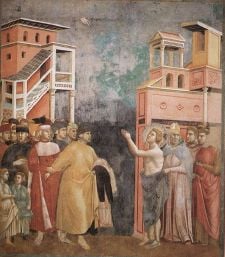
Among some groups, in particular religious groups, poverty is considered a necessary or desirable condition, which must be embraced in order to reach certain spiritual, moral, or intellectual states. Poverty is often understood to be an essential element of renunciation among Buddhists and Jains, whilst in Roman Catholicism it is one of the evangelical counsels, and taken as a vow among certain religious orders. The way poverty is understood among these orders takes a variety of forms. For example, the Franciscan orders have traditionally forgone all individual and corporate forms of ownership. However, while individual ownership of goods and wealth is forbidden for Benedictines, following the Rule of Saint Benedict, the monastery itself may possess both goods and money, and through history some monasteries have become very wealthy indeed.
In this context of religious vows, poverty may be understood as a means of self-denial in order to place oneself at the service of others; Pope Honorius III wrote in 1217 that the Dominicans "lived a life of voluntary poverty, exposing themselves to innumerable dangers and sufferings, for the salvation of others." However, following Jesus' warning that riches can be like thorns that choke up the good seed of the word (Matthew 13:22), voluntary poverty is often understood by Christians as of benefit to the individual - a form of self-discipline by which one distances oneself from distractions from God.
Notes
- ↑ Jared M. Diamond, Guns, Germs, and Steel (W.W. Norton & Company, 1999).
- ↑ Stephen Slivinski, Daniel Griswold, and Christopher Preble, Six Reasons to Kill Farm Subsidies and Trade Barriers Reason, February 2006. Retrieved October 27, 2020.
- ↑ Ian Vásquez, Ending Mass Poverty Economic Perspectives, September 4, 2001. Retrieved October 27, 2020.
- ↑ John Weiss and Haider A. Khan (eds.), Poverty Strategies in Asia: A Growth Plus Approach (Edward Elgar Publishing, 2006, ISBN 978-184542928).
- ↑ Nick Mathiason, Western bankers and lawyers 'rob Africa of $150bn every year The Observer, January 20, 2007. Retrieved October 27, 2020.
- ↑ Tirfe Mammo, The Paradox of Africa's Poverty: The Role of Indigenous Knowledge, Traditional Practices and Local Institutions - The Case of Ethiopia (Red Sea Press, 1999, ISBN 1569020493).
- ↑ James Mahoney, Long-Run Development and the Legacy of Colonialism in Spanish America American Journal of Sociology 109(1) (July 2003). Retrieved October 27, 2020.
- ↑ Hernando de Soto, The Mystery of Capital Finance & Development 38(1) (March 2001. Retrieved October 27, 2020.
- ↑ Arthur Vermeersch, The Moral Doctrine of Poverty The Catholic Encyclopedia, 1911 ed. Retrieved October 27, 2020.
- ↑ Will Kenton, International Poverty Line Investopedia. Retrieved October 27, 2020.
- ↑ Poverty: Overview The World Bank, October 7, 2020. Retrieved October 27, 2020.
- ↑ Deepa Narayan and Patti Patesch (eds.), Voices of the Poor: From Many Lands (Oxford University Press, 2002, ISBN 978-0195216035).
- ↑ Inequality and Shared Prosperity: Overview. Retrieved October 27, 2020.
- ↑ The Doing Business database A member of the World Bank Group. Retrieved October 27, 2020.
- ↑ Poverty Reduction Strategy Papers (PRSP) International Monetary Fund, December 28, 2016. Retrieved October 27, 2020.
- ↑ Thalif Deen, Tied Aid Strangling Nations, Says U.N. Inter Press Service IPS, July 7 2004. Retrieved October 27, 2020.
- ↑ John Stossel and Patrick McMenamin, Will More Foreign Aid End Global Poverty? ABC News, November 15, 2007. Retrieved October 27, 2020.
ReferencesISBN links support NWE through referral fees
- Allen, Tim. Poverty and Development: Into the 21st Century. Oxford University Press, 2000. ISBN 0198776268
- Bourke, Dale. The Skeptic's Guide To Global Poverty. Authentic, 2007. ISBN 1932805575
- DeVol, Philip. Bridges Out of Poverty. aha Process, 2006. ISBN 1929229690
- Diamond, Jared M. Guns, Germs, and Steel: The Fates of Human Societies. New York: W.W. Norton & Company, 1999.
- Iceland, John. Poverty in America: A Handbook, University of California Press, 2006. ISBN 0520248414
- Karelis, Charles. The Persistence of Poverty: Why the Economics of the Well-Off Can't Help the Poor. Yale University Press, 2007. ISBN 0300120907
- Kerbo, Harold. World Poverty: The Roots of Global Inequality and the Modern World System. McGraw Hill, 2005. ISBN 0073042951
- Landes, David. The Wealth and Poverty of Nations: Why Some Are So Rich and Some So Poor. W.W. Norton & Co., 1999. ISBN 0393318885
- Mammo, Tirfe. The Paradox of Africa's Poverty: The Role of Indigenous Knowledge, Traditional Practices and Local Institutions - The Case of Ethiopia. Red sea Press, 1999. ISBN 1569020493
- Narayan, Deepa, and Patti Patesch (eds.), Voices of the Poor: From Many Lands Oxford University Press, 2002. ISBN 978-0195216035
- Payne, Ruby. A Framework for Understanding Poverty. aha Process, 2005. ISBN 1929229488
- Sachs, Jeffrey. The End of Poverty: Economic Possibilities for Our Time. Penguin, 2006. ISBN 0143036580
- Smith, Steven. Ending Global Poverty: A Guide to What Works. Palgrave Macmillan, 2005. ISBN 140396534X
- Weiss, John, and Haider A. Khan (eds.). Poverty Strategies in Asia: A Growth Plus Approach. Edward Elgar Publishing, 2006. ISBN 978-184542928
- Yunus, Muhammed. Banker to the Poor: Micro-Lending and the Battle Against World Poverty. Public Affairs, 2003. ISBN 1586481983
External links
All links retrieved November 30, 2022.
- Alliance to End Hunger
- Bread for the World
- Global Distribution of Poverty Global poverty datasets and map collection
- Poverty and Pauperism Catholic Encyclopedia
- One
- The Crime of Poverty by Henry George
- A Principled Economics Approach To Poverty
Credits
New World Encyclopedia writers and editors rewrote and completed the Wikipedia article in accordance with New World Encyclopedia standards. This article abides by terms of the Creative Commons CC-by-sa 3.0 License (CC-by-sa), which may be used and disseminated with proper attribution. Credit is due under the terms of this license that can reference both the New World Encyclopedia contributors and the selfless volunteer contributors of the Wikimedia Foundation. To cite this article click here for a list of acceptable citing formats.The history of earlier contributions by wikipedians is accessible to researchers here:
The history of this article since it was imported to New World Encyclopedia:
Note: Some restrictions may apply to use of individual images which are separately licensed.
